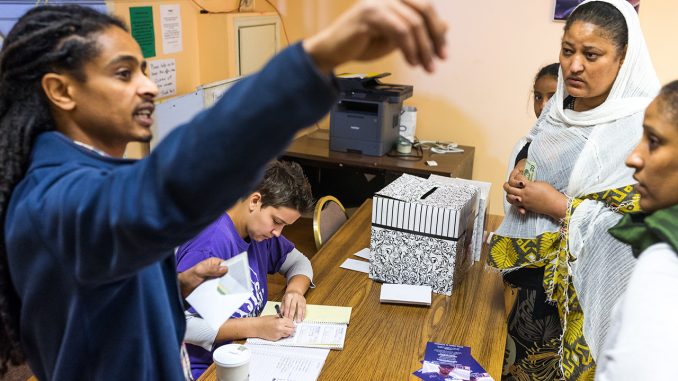
Temple University and Philadelphia’s Ethiopian communities are mobilizing around Kaleb Belay, an Ethiopian immigrant and former student who remains in the hospital after a police officer shot him on March 6, leaving him in critical condition.
“He is someone who was standing next to me in church Sunday, now I’m hearing that he was shot six times by a police officer,” said Hilena Gebru, a sophomore kinesiology major who has been active in Philadelphia’s Ethiopian community her whole life.
“You see…these things on the news, and you don’t think it’s going to be someone who you even have the smallest connection with,” she added.
Gebru and Belay both attended the Ethiopian Orthodox Tewahido Debre Selam Kidish Selassie Church in Southwest Philadelphia, but did not know each other well, Gebru said.
Gebru is a member of Temple’s Horn of Africa student organization, which aims to promote and spread awareness on Main Campus about the different cultures in Northeast Africa. She’s organizing a march to raise awareness for Belay’s case, contributing to a larger effort by the Ethiopian Community Association of Greater Philadelphia to raise funds for his recovery and legal expenses.
The march would take place in Center City on April 6, with help from Betty Mulugeta, a junior public health and psychology major at La Salle University who also participated and volunteered with the Ethiopian Community Association of Greater Philadelphia. Gebru and Mulugeta also contacted student organizations at multiple universities in the city to participate in the march.
The Horn of Africa organization’s application to block off streets for the protest is pending, Gebru said.
“Talking to different Temple students myself, I haven’t met anyone who knew about Kaleb, which is something to me that is very shocking,” Gebru added. “That is another one of our priorities, to make sure that Temple students are engaged, that they know about [the march], that they show up and come out.”
Belay is out of the intensive care unit after sustaining gunshot wounds to his chest and torso and has been making slow and steady gains, but he is still recovering in Penn Presbyterian Medical Center after nearly three weeks since the shooting, said Simon Haileab, Belay’s defense attorney, on Friday.
Haileab declined to comment on Belay’s pending case.
Police charged Belay, 25, with aggravated assault, simple assault and possessing the instrument of crime, according to court documents. The Philadelphia District Attorney’s Office is investigating the incident, said DA spokesperson Ben Waxman.
Leaders from the Ethiopian Community Association of Greater Philadelphia, including Addisu Habte, explained what they know about the shooting in both English and Amharic to attendees at a fundraiser for Belay on March 16 and 17. They detailed how the community plans to move forward, which includes sitting down with Philadelphia Police Commissioner Richard Ross Jr., DA Larry Krasner and witnesses to determine what happened the evening of March 6.
“We didn’t like how he was portrayed [by police] at the beginning, a knife-wielding man,” Habte said. “He’s never had any kind of record. A good kid.”
The GoFundMe page for Belay has raised nearly $13,000 since March 11 for his legal and hospital costs as of Monday. There will be another fundraiser for Belay at the Ethiopian community organization on Chestnut Street near 44th on Saturday and Sunday.
“It will be a long road of recovery for him,” Habte said. “…Is there a better way to not get shot six times, to not allow this to happen again?”
According to police accounts of the incident, two officers encountered Belay after responding to a police report of a stabbing on Hazel Avenue near 49th Street around 7 p.m. When police arrived, Belay allegedly emerged from a bush wielding a knife, approaching the two officers and advancing toward them after they asked that he drop the weapon, a police release stated.
Kevin Pfeifer, a four-year officer for the 18th District, shot Belay. Pfeifer was assigned to desk duty pending the DA office’s investigation.
“This incident is something that I feel like we’re all too familiar with hearing in the news nationally, in different places like Baltimore and Oakland and so forth,” Mulugeta said. “Now, it really just hits home because it’s in our community…especially within the Ethiopian community, I feel like people were just blindsided.”


Be the first to comment